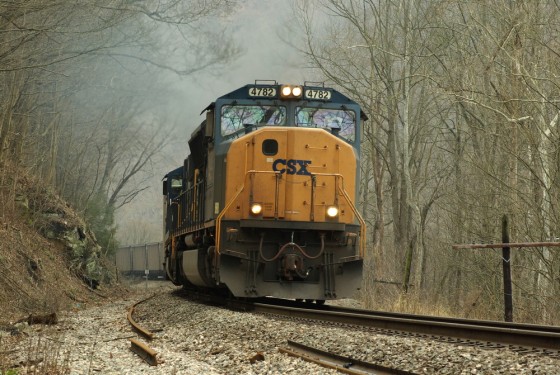Updated Wednesday, 9:00 a.m.
A train hauling North Dakota Bakken shale oil derailed on Monday in Lynchburg, West Virginia, igniting several tank cars, burning down a house and prompting the shut-down of water-treatment plants, authorities said. At least one tanker from the 109-car CSX train toppled into the Kanawha River south of Charleston and was leaking crude oil.
About, 2,400 residents around Adena Village, West Virginia, were evacuated as a precaution, the Charleston Gazette reported. Emergency shelters were set up at a local school and recreation center.
It was the second derailment in a year along the same CSX line, according to Reuters. A similar incident in Lynchburg, Virginia, last April involved a train that was also headed to Plains All American Pipelines LP’s oil depot in Yorktown, Virginia.
The train was hauling newer CPC 1232 model tank cars rather than older versions widely criticized for being prone to puncture. The recommended cars have safety features that include half-inch-thick steel shields on the sides to prevent splitting if they are overturned.
With production on the rise in North America, oil companies are increasingly challenged with finding ways to transport their product.
Pipeline networks do not yet have the capacity or flexibility to handle the job, so oil companies have relied on railroads to fill the gap.
In 2013, rail shipments of crude oil in the United States skyrocketed, with 400,000 carloads transported compared to 4,729 in 2006, according to the Association of American Railroads (AAR).
CSX said in a statement on Tuesday:
Overnight, CSX personnel and agencies continued their assessment of the derailment scene to verify the number of rail cars involved and the extent of the potential environmental impact. CSX estimates that approximately 25 tank cars derailed and 20 cars were involved in subsequent fires; the fires around the rail cars will be allowed to burn out. When safe to do so, CSX and its experts will begin transferring oil from the damaged cars to other tanks and those tanks subsequently removed from the site. Initial assessments have confirmed that several of the cars appear to be ruptured or leaking from valves.
No rail cars entered the Kanawha River in this incident.
CSX teams continue working to deploy environmental protective and monitoring measures on land, air and in the Kanawha River as well as a creek near the company’s tracks. The company also is in contact with public officials and investigative agencies to address their needs.
Approximately 100-125 residents of homes near the derailment site remain evacuated at this time. CSX is working with the Red Cross and other relief organizations to address residents’ needs, taking into account winter storm conditions. The company opened a Community Outreach Center Tuesday, February 17, at 8 a.m.; the center will remain open until every day 8 p.m. EST or later if needed. CSX has secured a number of hotel rooms for displaced residents and is assisting them in relocating from evacuation centers to the hotels.
online pharmacy zydena with best prices today in the USA
CSX said on Monday that it has removed the non-derailed cars from the scene of the derailment and efforts continue to re-rail the remaining cars. The company said it is cooperating fully with agencies in the investigation being led by the National Transportation Safety Board.

